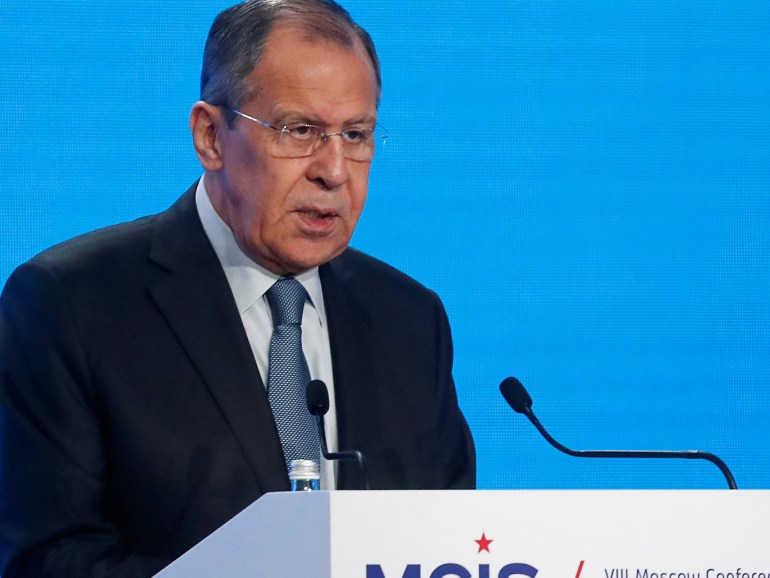Tehran -
After the optimism that prevailed in the atmosphere of the negotiations on the Iranian nuclear file on the eve of the launch of the eighth round in the capital, Vienna, pessimism once again hangs over the statements issued by Iran, Russia and the United States regarding the possibility of reaching an agreement and the period needed to resolve the negotiations.
With the rise of global fears of a possible war in Ukraine, the countdown to reaching an agreement in the Vienna negotiations stopped, and there was talk of a major rift between the demands of the two parties;
Iranian and American.
After a remarkable statement by Russian Foreign Minister Sergei Lavrov, in which he said that "there is still a long way to go before reviving the nuclear agreement", Iranian President Ibrahim Raisi's statements cut doubt in his speech on the anniversary of the Iranian revolution last Friday, in which he said that "Tehran does not count on the Vienna negotiations and the relationship with Washington.
These positions coincide with the briefing of the US envoy to Iran, Robert Malley, before the Committee on Foreign Relations in the US Senate, about the course of the Vienna negotiations, which Democratic Senator Chris Murphy described as “shocking”, while the White House talked about preparing emergency scenarios. .
Russian Foreign Minister Sergei Lavrov said there is still a long way to go before reviving the nuclear agreement (Reuters)
Russian interest
Observers in Iran unanimously agree on the impact of the Ukrainian crisis on the course of the nuclear negotiations in Vienna, but some of them believe that a possible war on Ukraine will benefit the Iranian side, while others believe that the crisis will push the Russian side to put sticks in the wheel of the ongoing negotiations with the Western side. To prolong it and keep the American camp involved.
For his part, the former Iranian ambassador to Norway, Sri Lanka and Hungary, Abdolreza Faraji Rad, expected the American side to show greater interest in reaching an agreement on the Iranian nuclear deal in light of the escalation of the Ukrainian crisis, explaining that the last Russian position on the existence of a rift before reaching a nuclear agreement in Vienna It indicates that Moscow sees prolonging the negotiations in its interest at the present time.
In an interview with Al-Jazeera Net, Faraji Rad expressed his belief that Russia, which is involved in the Ukrainian crisis, sees that resolving the negotiations in Vienna is not in its interest, stressing that reaching an agreement between Iran and the western side constitutes an obsession for Moscow for fear that the Western camp will devote itself to a possible war on Ukraine.
The Iranian diplomat added, "Even before the intensification of the Ukrainian crisis, the permanent Russian representative to international organizations in Vienna, Mikhail Ulyanov, was more enthusiastic about the proximity of negotiations to the agreement, but his tone changed recently regarding the progress made in the negotiations."
Ferji Rad concluded that Russian President Vladimir Putin aspires to raise his popularity ahead of the upcoming elections in his country, similar to the 2014 annexation of Crimea, stressing that war on Ukraine will become inevitable if Western pressure fails and Moscow does not obtain guarantees that NATO will not expand to the borders of Russia.
It enhances the Iranian delegation's standing
On the other hand, the researcher in international affairs, Mustafa Khosh Jashem, believes that the Ukrainian crisis strengthens the position of the Iranian negotiating delegation in Vienna, adding that the strength of the United States is no longer what it was in the past decades, and it can no longer have an active presence on more than one front;
Be it political or military, he said.
Khosh Jashem told Al-Jazeera Net that the escalation of tension between Russia and the United States is exposing Washington to great pressure and undermining its position in front of the Iranian-Russian-Chinese triad in the Vienna negotiations, explaining that the Ukrainian crisis will be reflected in the convergence of views between Iran and Russia to put pressure on the western side.
Khush Jashem attributed the pessimistic statements about the Vienna negotiations to the US side's procrastination in providing guarantees that it would not withdraw from the nuclear agreement again and lift the full sanctions on Tehran.
But he added that the main reason behind prolonging the negotiations is due to the differences in the American negotiating delegation in Vienna on the one hand, and between the American circles in Washington on the other.
He added, "Washington wanted to increase the Iranian street's pressure on his government, to make concessions in the Vienna negotiations, by showing a breakthrough in Iranian markets that would improve the lives of Iranian citizens."
He concluded that the Ukrainian crisis will speed up the pace of the nuclear negotiations in Vienna, and that the eighth round will most likely be the last, and that the parties involved in it will see themselves compelled to announce during the next two weeks about its success or failure.

